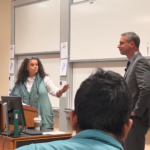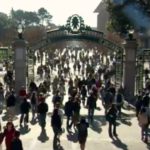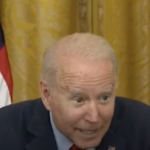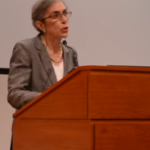Reading Blue & Red
ELIZABETHTOWN, PA — The Elizabethtown College faculty recently voted to endorse (and presumably to implement) a 19-page document titled “Embracing Inclusive Excellence: A Five-Year Plan for Strengthening Campus Diversity.”
The plan passed by a margin of five to one, although nothing would suggest that most of those who voted for it ever read the text. The expressions of endorsement from its authors and advocates were mostly anecdotal. Statements of support included these observations: “My black students and advisees show courage by coming to class” and “The blacks where I live in Philadelphia look as if they’ve no hope left.”
When the committee’s head was asked why no critics of the document were appointed to his group, his candid answer was “They’d have pulled in the reins.” A much younger colleague of mine, who is publishing a book with Johns Hopkins Press on diversity policies on college campuses, was not permitted to serve on this committee; neither was I, although my book on multicultural practices here and in Europe (Multiculturalism and the Politics of Guilt: Toward a Secular Theocracy) has been translated into 10 languages, most recently Rumanian.
Some of the assertions in the document made my head spin. Claims that Jews, Muslims, and Hindus on our campus are feeling the brunt of white Christian insensitivity are never documented. In fact, there is no evidence of prejudice being vented against any of the allegedly victimized groups; nor would the lack of interest in Christianity among my nominally Christian students indicate that they are full of religious rage against non-Christian students. Those non-Christians who were interviewed about “prejudice” on campus were asked if they noticed others “glancing” at them. The impression conveyed is that they were being stared at.
Moreover, the solution that the college is supposed to embrace, in order to deal with outbursts of prejudice against the largely absent Jews, Muslims, and Hindus, seem to have nothing to do with the evils cited. We are supposed to work harder to recruit and retain “historically underrepresented minorities,” a term that, as best I can figure out, refers to inner city blacks. The students and faculty who engage in this enterprise will be showing “deep critical intelligence,” as opposed to the ordinary kind of thinking that students need to learn calculus or ancient Greek. I would be delighted if all of my students displayed enough smarts to do serious college work. We will leave the “deep” stuff to those who specialize in murky rhetoric.
But the story goes on! Once the obligatory outpouring of good will is underway, “deep critical intelligence” will lead to “engagement” among white students and the members of minority groups drawn from urban areas. Presumably all diversitarians will come to appreciate each other’s differentness, although there is not a shred of evidence that would justify this conclusion.
My colleague, who has done considerable research on diversity policies at UCLA and the University of Michigan, stresses these policies often yield unpleasant consequences. Members of the educationally and socially diverse groups who are brought together have little in common and tend to stay away from each other. Where this is not the case, it is only because students, albeit from different ethnic backgrounds, are culturally similar and manifest comparable learning skills. One might also ask whether our college would be willing to put additional funds into remedial education, to bring up to speed those they intend to recruit. Well-prepared and gifted minority students have more promising educational options elsewhere.
Most of my colleagues had no desire to discuss any of these problems. They were also averse to making changes on the document under consideration for the sake of factual accuracy. They just yearned to endorse it. Although the college administration clearly wanted to pass a diversity plan, the president, who was at the meeting, showed concern about the quality of the document. But most of the faculty members had no such interest. They were too busy salivating over the word “diversity” on the title page and vying with each other in their manifestations of political correctness. Some may have been trying to wangle a pay raise or a promotion, but I doubt this explains the behavior of most of the faculty members.
No pressure was put on them to support the plan; on the contrary, the president was willing to integrate dissenting opinions into what was sent to the board. The faculty members, not the president, behaved with a degree of ideological zeal that I have rarely encountered. What they voted for, without much evidence of critical thought, will affect the classroom assignments; and it will require them to attend training classes in affirmative action. Their impatience with factually-grounded objections and the way some of them looked suspiciously at dissenters took me aback. After this gathering, the last thing I would attribute to my colleagues is a capacity for reasoned discourse, a quality that I once associated with college teaching.
One week after the events described in this commentary were published in the Lancaster newspapers, the Elizabethtown College Student Senate voted overwhelmingly against the diversity plan passed by the faculty and supported by the administration. The student vote was achieved in the face of organized bullying by faculty members and administrators sent by the president to make sure the students voted the right way.
Despite the name-calling engaged in by one social work professor in particular, all the evidence indicates that the students were not intimidated. They showed up the faculty and provost by asking them to define the “social justice” that the student opposition was alleged to lack. Several students scolded the provost for using statistically invalid measurements to arrive at the unfounded judgment that the college was deeply bigoted. After this embarrassing incident, the president sent his letter of endorsement to the trustees, noting that the “students had reviewed the plan.” Not surprisingly, the report did not mention what the review consisted of.
The Ornery Observer is copyright © 2009 by by Paul Gottfried and the Fitzgerald Griffin Foundation. All rights reserved. A version of this column appeared in the Lancaster (Pennsylvania) Newspapers in October 2008. All rights reserved.
Paul Gottfried, Ph.D., is the Raffensperger professor of Humanities at Elizabethtown College in Pennsylvania. See a complete bio and other articles.




